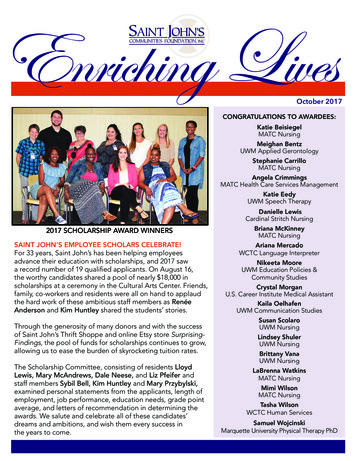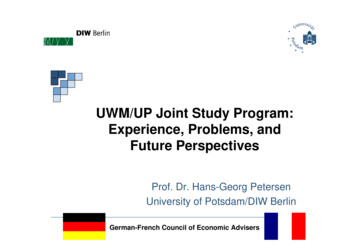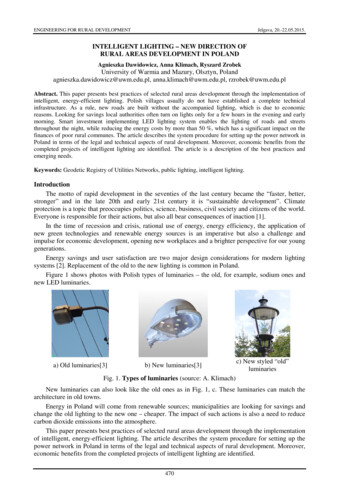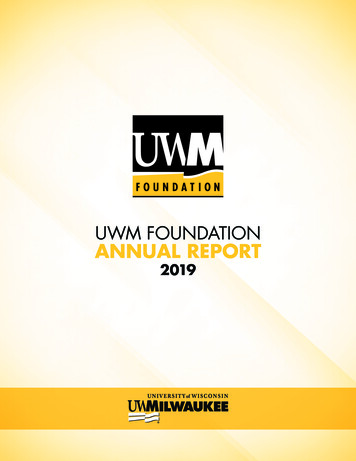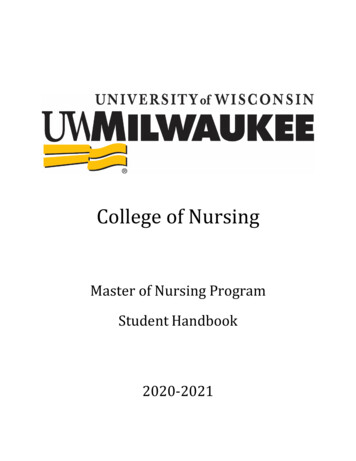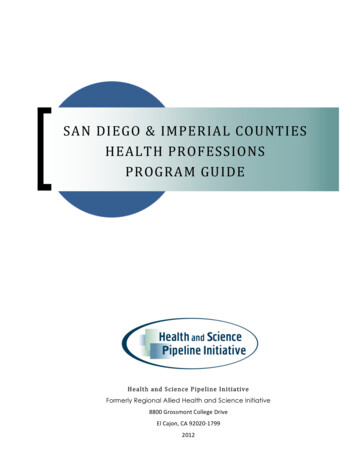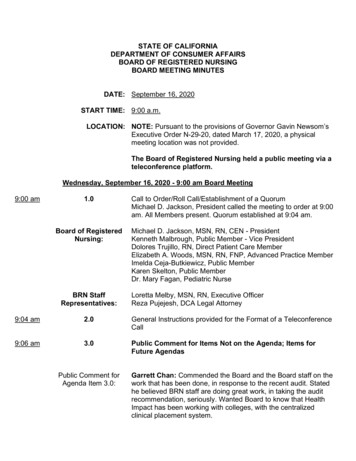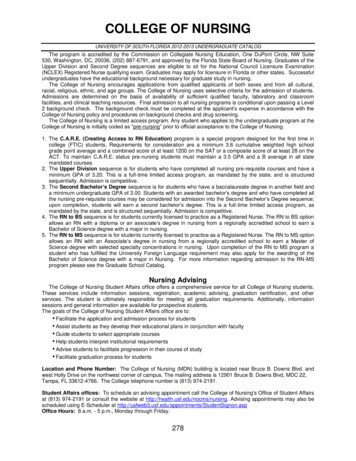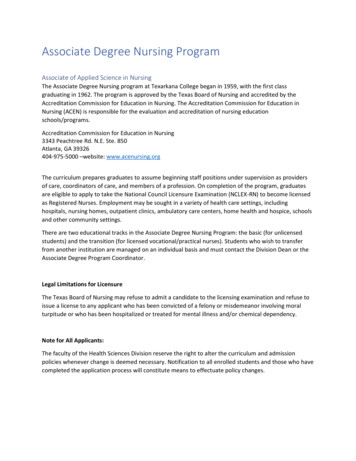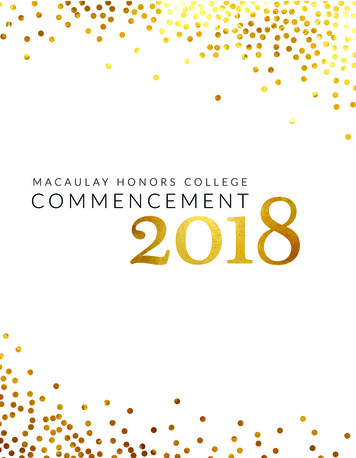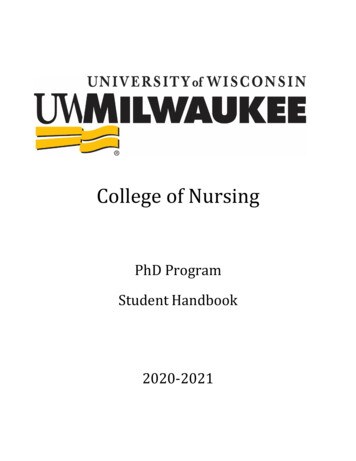
Transcription
College of NursingPhD ProgramStudent Handbook2020-2021
UWM CON PhD Student Handbook – 2020-2021TABLE OF CONTENTSPurpose of Handbook1People Resources1Message from the PhD Program Director2COVID Statement3Statement of Philosophy5Vision, Mission, Core Values and Guiding Principles6Funding Sources7Nurse Faculty Loan Program (NFLP)8Nurse Faculty Loan Program Request for Leave of Absence form10PhD Milestones and Program Expectations GPC # 09-05-08B11Faculty Expectations for MNRS12Review for Protection of Human Subjects in Research13Doctor of Philosophy in NursingDoctor of Philosophy in Nursing Program GPC #05-05-17(3)C14Specialty Elective Courses19Practicum in Nursing Research Guidelines GPC # 11-03-95 (2)E20Program AdvisingAdvisory Process and Procedures GPC # 01-01-94D29Three Year, Four Year and Five-Year, BS to PhD, Online (everyother year start)32Initial Plan of Study-Form38PhD Flow Chart40Formal Plan of Study Guidelines GPC # 01-02-94C41Checklist for Submitting a Plan of Study45Request to Change Major Professor GPC # 12-05-14B46Annual Review of PhD Student GPC #10-06-06B47Qualifying ExaminationQualifying Examination Policy GPC# 05-04-1849Qualifying Examination Guide and Administration50Qualifying Examination Rubric58Qualifying Examination Student Evaluation63Comprehensive ExamComprehensive Exam Checklist64Comprehensive Preliminary Examination Guide GPC #11-02 95G65
Comprehension Action Plan69Student Performance on Comprehensive Examination Form A-170Self-Evaluation of Comprehensive Examination Form A-271Student Achievement of PhD Program Objectives Form A-372Comprehensive Written and Take-Home ModeComprehensive Examination Project Cover Sheet (manuscript option)73Comprehensive Examination Project (manuscript option)76DissertationDissertation Checklist77PhD Student Performance on Proposal Hearing78Policies and ProceduresGraduate Student Request for an Exception-Form79College of Nursing Dissertation Policy GPC # 02-06-09C81Role of Major Professor and Dissertation Committee GPC # 11-03-95(1)84Prep for Defense Checklist86PhD Student Performance on Dissertation Defense87Progression in Graduate Level Programs and Certificates88Graduate Grading Scale90Nursing Appeal Policy and Procedure GPC #05-05-17A91Graduate Student Request for A Step 2 Appeal-Form95Procedure for Graduate Students Requesting Exceptions to College of Nursing Rules andPoliciesPolicy Pertinent to Undergraduate and Graduate Courses96Policy Regarding Students Auditing Courses99Policy Pertinent to Credits Taken as a Non-Degree Candidate99Program Completion: Policy on Time Limit for Program Completion99Grading Policy for Research/Dissertation99Extra Credit Policy9999Professional Expectations of Students in Academic and Practicum/Clinical Settings100Technical Standards110Technology Use and Electronic Media Policy CP # 05-05-17112Student ResourcesMicrosoft TEAMS TIPS114Writing Editors117Faculty Research Interests118Schedule Milestone Event Guide (Comprehensive, Proposal or Defense)125Student Participation in College of Nursing Governance126
Purpose of HandbookThe purpose of this handbook is to provide current students with information about the PhD program atthe University of Wisconsin-Milwaukee College of Nursing. In addition, all policies and procedures withinthe College of Nursing can be found on the Canvas site. The PhD Spot is found through CANVAS and isanother resource where students can find forms, and other academic and program specific information.Program revisions happen throughout the academic year. Those changes will be communicated to studentsthrough their panther UWM email and/or posted on Canvas. All forms can be found on the PhD Spot.People ResourcesDr. Julie Snethen, PhD Program Director: E-mail: julia@uwm.edu Phone: 414-229-5505Susan Wolff, Admin Program, Coordinate NFLP: E-mail: wolff3@uwm.edu Phone: 414-251-6386Jennifer Daood, Senior Academic Student Affairs Advisor: E-mail: daood@uwm.edu Phone: 414-229-5474Robin Jens, Assistant Dean of Student Services: E-mail: rjens@uwm.edu Phone: 414-229-2494Lynn Helmke, Admin Support (Student Affairs Office): E-mail: helmke@uwm.edu Phone: 414-229-5047Michael Walk, Office Manager (Scholarship Coordinator): E-mail: walk@uwm.edu; Phone: 414-229-4341Doctoral Nursing Student Organization (DNSO) Officers 2020-2021Chris Peters, DNSO President, E-mail: peterscc@uwm.eduAshley Ruiz, DNSO Vice President, E-mail: ruizam@uwm.eduSuzanne Kreuziger, DNSO Secretary, E-mail: kreuzig5@uwm.eduRebeccah Collins, DNSO DNP Representative, E-mail: colli364@uwm.edu1
Message from the PhD Program DirectorWelcome to the College of Nursing at the University of Wisconsin-Milwaukee (UWM). Our goal is to make yourexperience here at UW-M and specifically within the College of Nursing, a rewarding and successful one. TheDoctor of Philosophy degree (PhD) in nursing science at UWM CON is a rigorous research-based program thatprepares nurse scientists and scholars to advance the discipline of nursing in the 21st century. Students in thePhD program in nursing incorporate empirical research, scientific principles and theories to discover anddisseminate new knowledge, building on existing knowledge, refining nursing science and advancing healthcare.PhD doctoral education is focused on advancing research, education, policy, and practice within the discipline ofnursing and interdisciplinary contributions to science.Our curriculum is designed to ensure the PhD student develops the expertise to successfully conductindependent and team science research. Therefore, the PhD curriculum provides a series of nursing andinterdisciplinary courses, including: philosophy of nursing science, research methods, health policy, independentstudies, seminars and research practicums. Students work closely with their major professor (MP) to develop anindividualized formal plan of study, which is foundational to initiating the student’s dissertation and futureprogram of research.Doctoral students are major constituents and stakeholders at UWM College of Nursing, as pursuing a PhDdegree requires a significant commitment of time, energy and resources. Students in the PhD program areencouraged to explore their academic interests to develop as a scientist, author, leader, scholar and educatorwithin the discipline of nursing and the healthcare community. Faculty have extensive experience in educatingand mentoring doctoral students and are committed to facilitating student success at the UWM College ofNursing. Students work with their Major Professors and faculty to enrich their academic experience by attendingseminars, conferences, and writing workshops.Pertinent information on the policies, procedures and requirements for the PhD program are incorporated intothis student reference guide. Students in the PhD program need to familiarize themselves with the content ofthe handbook. The UWM Graduate School Student Bulletin provides general requirements applicable to alldoctoral students enrolled at UWM. Students during their PhD program need to review and refer to the UWMGraduate School Student Bulletin. Questions related to the curriculum and student progression in the program,can be addressed by the graduate student academic advisor, major professor or Director of the PhD Program.Students are encouraged to contact me if they have any questions, concerns, or just want to discuss theiracademic program. As previously mentioned, our goal is to make your experience here at UWM and specificallywithin the College of Nursing, a rewarding and successful one.Sincerely,Julia A. Snethen, PhD, RN, FAANPhD Program Director and Professor,University of Wisconsin-Milwaukee College of Nursing julia@uwm.edu2
COVID-19 Information for Students – UWM College of NursingThe following guidelines are intended for students enrolled in academic programs offered within theCollege of Nursing. The safety of students and faculty within the College of Nursing is of the highestpriority. Given that many of our students are also essential workers, every possible precaution will betaken to allow students and faculty to be as safe as possible while also providing the highest qualityeducational experience.The UWM Emergency Operations Center Report is the main source of these guidelines. This report canbe accessed here: er-Report Final.pdfThese guidelines are categorized as:1) General guidelines,2) Guidelines when inside Cunningham (UW-Milwaukee) or Tallent Halls (UW-Parkside), and3) Guidelines when in class at off campus sites such as community agencies, schools, and healthcare facilities.General Guidelines Wash hands with soap and water for at least 20 seconds. Keep a supply of hand sanitizer.Do not touch your eyes, nose, or mouth with unwashedhands.Wear a covering to cover both the mouth and nose when indoors and anytime 6 feet of distancecannot be maintained.Cover your cough or sneeze.Clean all high touch areas at home and school.Avoid crowded areas. Keep six feet of distance between yourself and others.Ask yourself the screening questions before going to class on campus or into clinical and communitysettings.o COVID-19 Screening Questions People with COVID-19 have had a wide range of symptoms reported – ranging from mildsymptoms to severe illness. Symptoms may appear 2-14 days after exposure to thevirus. Have you had these symptoms in this pasttimeframe?Yes NoSymptom/ExposureFever or chills (100.4 F or greater)CoughShortness of breath or difficulty breathingFatigueMuscle or body achesHeadacheNew loss of taste or smellSore throatCongestion or runny noseNausea or vomiting3
DiarrheaHave you been in close contact with others throughwork, home or the community who have testedpositive for COVID-19?(CDC, 2020) UWM students who have concerns about symptoms or potential exposure areencouraged to call Norris Health Center at (414) 229-4716 to speak with a medicalprofessional who can provide additional guidance. https://uwm.edu/norris/healthservices/Nursing students taking courses at UW-Parkside with concerns about symptoms orpotential exposure are encouraged to call UWP Student Health and Counseling Center(262)595-2366 to speak with a medical enthealth/Communicate COVID-19 exposure or illness to your instructors as soon as possible.Instructors will work with the Program Director to develop a plan with thestudent.Stay home if you are sick.Guidelines When Inside Cunningham Hall The covering of the mouth and nose (such as a cloth mask) is required within Cunningham Hall.o A mask may be removed when an individual is alone in their ownoffice.It is extremely important, for infection control, that students not wear to campus clothing that wasworn in hospital or other health care setting where direct patient care is provided. Students who wear scrubs or white coats to campus are responsible for ensuring theyare clean before arriving to campus. If you are unable to clean scrubs or white coatsprior to coming to class, please change into clean street clothing before coming tocampus. Talk to your advisor about any concerns.Students will be provided, are required to wear, personal protective equipment (PPE) whenattending classes where social distance cannot be maintained (e.g., health assessment labs,psychomotor skills).Students and staff will monitor the flow of traffic to maintain six feet of distance when entering andexiting rooms.The College of Nursing has a “if you touch it, you clean it" policy during simulations and skills in theCollege of Nursing. This is an important teachable activity for nursing students to understandpotential transmission, infection control and prevention.Guidelines When in Class at Off Campus SitesStudents will adhere to facility and unit specific requirements for symptom screening and PPEuse.Students will follow any facility-based travel restrictions related to COVID-19.Noncompliance will result in consequences including being denied entry to class, clinical, andimplementation of the Professional Expectations of Students in Academic and Clinical Settings policy (CP 0501-17B)Please note that these guidelines are subject to changes as new information becomes available toremain aligned with federal, state, and local public health recommendations. Students will be notifieddirectly of changes.4
Fac Doc #(87-04)093AStatement of PhilosophyConsistent with and evolving from the core values the following principles about human beings, environment, health,nursing, learning, and teaching guide the educational programs of the University of Wisconsin-Milwaukee College ofNursing (UWM-Milwaukee, CON).Professional nurses are educated at a variety of curricular levels for generation, application, and evaluation ofknowledge. The teaching-learning process is interactive. Learning requires active student participation and is enhancedwhen the instructional environment is respectful and supports personal worth, dignity and self-identity in the teacherand the student and encourages each person to grow and discover meaning.Each human is a unique, dynamic, integral being. Human beings exist within physical and social environments. Theseenvironments are shaped by dynamic events in socio-cultural, natural, local and global political milieus. Actions ofindividuals and groups also shape these environments that provide the context within which health and nursing systemsoperate. Nursing is committed to social justice, challenges existing paradigms when appropriate and creates innovativesolutions for health care problems.Nursing is a socially derived profession whose members assist person, families, groups and the larger society to pursuethe goal of optimum health. Health is a dynamic state influenced by the constant interaction of internal and externalfactors. Health status is reflective of the well-being of individuals and aggregates within environments and encompasseswellness, risks, problems, and needs that may be or have the potential to be present.Through the use of the nursing process, dynamic interactions between the nurse and the client facilitate the promotion,maintenance, or restoration of health. The knowledge base of nursing must be continually developed and evaluated inresponse to changing environmental health needs. Nursing care is guided by professional standards and requirespersonal and professional integrity.Nursing, as a human interaction, is most effective when nurses reflect the population that it serves. The CON seeks toadmit and educate a diverse student body in order to enrich the students’ educational experience and to prepare themto meet the health needs of a diverse society. Therefore, a holistic review of applicants to the CON includes anevaluation of academic achievement, work and leadership experiences, personal and professional accomplishments,skills, abilities and personal qualities. Consideration of these factors as well as a wide range of economic, social,racial/ethnic and geographic backgrounds will enhance diversity within the CON and the nursing profession.School of Nursing Faculty approved Faculty Document #(87-04)093 on April 3, 1987; 09/13/02 (ed.)CON Faculty approved Faculty Document #(87-04)083A on November 17, 2006.5
Faculty Document # (96-09) 100BVision, Mission, Core Values and Guiding Principles of the College of NursingVision StatementAs an innovative, academic, nursing community, the University of Wisconsin-Milwaukee College of Nursing faculty, staff,students, and alumni are renowned leaders in creating bold and effective solutions for advancing local, national andglobal health.Core ValuesWe, the University of Wisconsin-Milwaukee College of Nursing community, embrace and demonstrate these core valuesin our learning, teaching, research, practice, and service: Accountability Collaboration Creativity Diversity Excellence Integrity Human Dignity Social JusticeGuiding PrinciplesAs a diverse Community of Scholars that values passionate, academic discourse and debate in a climate of civility, welive our core values and create opportunities to embrace, welcome, respect, and strive tounderstand the perspectives of others – colleagues, students, patients/clients, and community partners. As a CONcommunity, we: live our core values; exhibit respectful, transparent and clear communication; expect and embrace shared accountability; appreciate and foster innovation; and seek collaboration in teaching, research, practice and service.Mission StatementThe University of Wisconsin-Milwaukee College of Nursing is a premier, urban, academic, collegial, nursing communitythat acts collaboratively with partners to: Prepare a diverse population of students to become science based, compassionate, nurse leadersthrough innovative, quality, educational programs for all settings and levels of practice; Conduct research and scholarship that advance science in nursing and health; Address emerging health needs through evidence-based practice and consultation; and Develop leaders who transform health care delivery and health policy.6
Funding SourcesDoctoral students in the College of Nursing are eligible to apply for many types of financial aid and scholarships.These include:1.2.3.4.5.Graduate School Fellowships and Advanced Opportunity Program FellowshipsTeaching and Project AssistantshipsFinancial Aid-LoansGraduate School TravelAwardNurse Faculty Loan Forgiveness Program (NFLP)1. Graduate School FellowshipsFellowships are competitive and are based on scholarly achievement and promise. Attendance must be full-timefor any of the Graduate School Fellowships. Fellowship applications can be picked up at the Graduate School or ofthe Graduate School website in late fall for the following academic year.2. Teaching Assistants - A teaching assistant is appointed to teach a course(s) in the College of Nursing.Appointments are generally half-time or less and usually permit the student to carry a full load of graduatecourses. The stipend varies according to the length and percentage ofappointment.Project Assistants - A project assistant is appointed to assist with a research, training, or other academic projectthat is not required as part of the person’s graduate degree program. These appointments are made by individualprofessorswithin the department.3. Financial AidLoansDepartment of Financial Aid for more information about these types of opportunities.finaid@uwm.edu - for general questions, to speak to an advisor and/or to make an appointment.4. Graduate School Travel AwardsPresenting at national and international professional conferences, or performing or exhibiting original work, is animportant part of the professional development of graduate students. Involvement in these activities is critical forestablishing professional networks and contacts for collaborative research and can lead to future funding andemployment opportunities. Students enrolled in UWM doctoral programs are eligible for awards from theGraduate School in support of travel expenses for presenting papers at national or international professionalmeetings or conferences, or for performing or exhibiting original work. The student's presentation must beofficially recognized by the sponsoring organization. The limited funds available for travel support make this ahighly competitive program.5. Nurse Faculty Loan Forgiveness Program (NFLP)The NFLP is aim at nurses who want to earn their doctorate degree and teach full-time post-graduation. Inexchange for teaching full-time for 5 years, 85% of the NFLP loan is forgiven. Each student must complete at least6 credits of education-based courses from an approved course list while in their doctoral program. See thefollowing pages for contact information and details.7
Nurse Faculty Loan Program (NFLP)Information You Need to Know (2020-21)It is important that you clearly understand the terms and
Doctor of Philosophy in Nursing Doctor of Philosophy in Nursing Program GPC #05-05-17(3)C 14 Specialty Elective Courses 19 Practicum in Nursing Research Guidelines GPC # 11-03-95 (2)E 20 Program Advising Advisory Process and Procedures GPC # 01-01-94D 29 Three Year, Four Year
